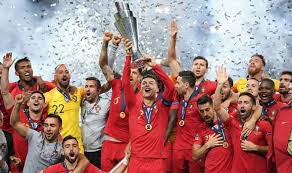June 10 – Portugal won the inaugural Nations League defeating the Netherlands 1-0 to record a historic double for Fernando Santos’ team. England claimed third-place in the competition, edging Switzerland on penalties.
The final was a flat end-of-season affair that was settled by Valencia forward Guedes at the hour mark. The game had been billed as a clash between Cristiano Ronaldo and Virgil Van Dijk, the two captains of both teams, but it was Guedes who proved to be the difference between the reigning European champions and the resurgent Dutch, who missed out on the 2018 World Cup.
With the win, Santos’ team added the maiden Nations League to the 2016 European crown. The Portugal coach revealed that marking Barcelona-bound Frenkie de Jong out of the game was key in defeating the Dutch. “We knew that if we curtailed his freedom we would stand to gain,” said Santos. “My players’ instructions were to play the ball whenever they had it and to balance our defence by keeping an eye out to curtail the freedom De Jong and [Virgil] van Dijk would have.”
In 2018 England lost the bronze medal match at the World Cup against Belgium. In Portutgal, they reversed their fortunes against the Swiss to win 6-5 on penalties and end the season on a high. The Three Lions had been knocked out in the semi-finals by the Dutch, a match overshadowed by unruly behaviour of traveling England fans.
UEFA introduced the Nations League in a bid to revive international football and give countries more chances to play against teams of a comparable standard. The European federation first mooted the idea of an entirely new competition in 2011 and after some shapeshifting the result was the four-tiered Nations League with a group stage that funnelled into a four-team finals competition that also offers an alternative route to Euro 2020.
“It is a new competition and like every newborn it takes time to establish itself, settle down and be recognised, but we think we have good ingredients for success,” said UEFA director of competitions Giorgio Marchetti. “This will turn most of the friendlies into competition matches and that will be a much better proposition for fans.”
Marchtti’s words rang true during the group stages when A-listers played each other in competitive matches, much to the interest of fans and TV audiences. There were some remarkable results: Netherlands – Germany 3-0, Switzerland – Belgium 5-2, and Spain – Croatia 6-0. At the other end of the spectrum, the Nations League allowed the smaller nations to play in more meaningful and more competitive games. But with a six-month gap between the conclusion of the group stages and the actual finals, interest dissipated.
In total, UEFA distributed a prize pot of €112.875 million. Concacaf has followed the European model and FIFA contemplated doing the same thing. Last week FIFA boss Gianni Infantino revived the idea of a global Nations League idea for women’s football. On balance, the competitive nature of games, the fan interest, the prize money and a sensible use of the calendar have made the first edition of the Nations League a success.
Contact the writer of this story, Samindra Kunti, at moc.l1734862713labto1734862713ofdlr1734862713owedi1734862713sni@o1734862713fni1734862713

